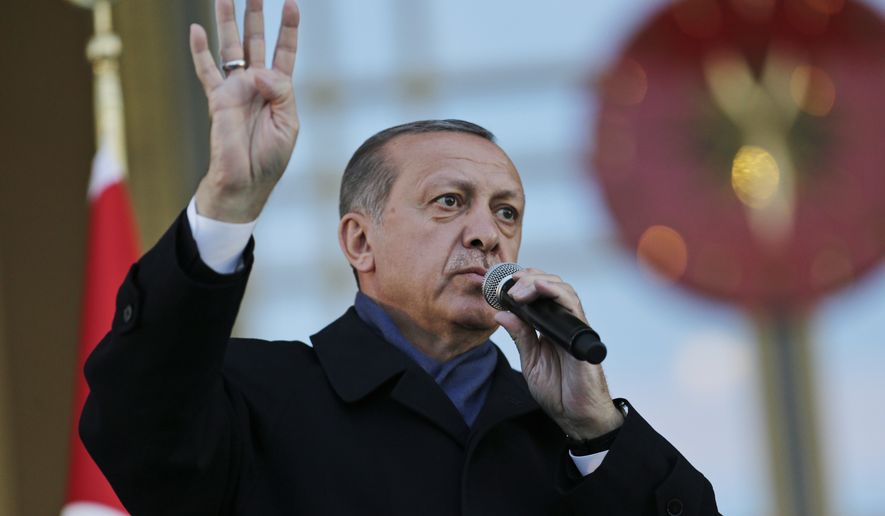Sunday’s referendum narrowly granting expansive new powers to President Recep Tayyip Erdogan may distance Turkey from the pro-democracy forces of Western Europe, but could bring it closer to Washington, where the Trump administration has shown itself eager to build counterterrorism alliances with perceived strongmen in the Middle East.
While the United Kingdom and the European Union questioned the legitimacy of Sunday’s national vote, President Trump phoned Monday to congratulate Mr. Erdogan on winning the authority to restructure Turkey’s parliamentary system and absorb many of the powers of its legislature, the Reuters news agency reported.
Analysts say the development is unlikely to dramatically alter Turkey’s foreign policy, including Ankara’s bare-knuckle posture toward the region’s Kurds. Mr. Erdogan, they say, can also be expected to more warmly embrace overtures from Washington as a possible distraction from the appearance of total isolation from the West.
“Basically, the White House doesn’t care about human rights or freedom of law or freedom of press, while the EU is very concerned about the direction that Turkey is going,” Cenk Sidar, a Maryland-based Turkish opposition member, said in an interview Monday.
But leaders across the EU continue to harbor doubts when dealing with Mr. Erdogan, whom they find divisive. Mr Erdogan has often used criticism from the West as a political badge of honor.
The EU’s main election monitoring body, the Organization for Security and Cooperation in Europe, said in a statement backed by British officials, that Sunday’s referendum was conducted on “an un-level playing field,” with many voters unaware about the consequences of the vote and the media and arms of the governments strongly in Mr. Erdogan’s favor.
Mr. Erdogan publicly dismissed the charge Monday, denouncing the West’s “crusader mentality” during a speech to flag-waving supporters. He also asserted that foreign election observers should “know their place” and that Turkey did not “see, hear or acknowledge” criticism that the vote did not live up to international standards.
But French President Francois Hollande, Austrian Foreign Minister Sebastian Kurz and German Chancellor Angela Merkel all issued statements urging Turkish society to engage in more open political dialogue and lamenting how “divided” the current Turkish political environment has become under Mr. Erdogan’s rule.
The U.S. State Department on Monday urged the Turkish government to protect basic rights and freedoms as the votes are verified, while White House Press Secretary Sean Spicer declined to comment while the election results were still being verified.
Prior to Sunday’s referendum, Ms. Merkel and Mr. Erdogan had engaged in war of words over the Turkish president’s attempt to campaign across Germany to win support from the 1.5 million-strong Turkish diaspora there.
The Germans, who feared Turkey’s new presidential-style government will be too autocratic and distant from European values, made international headlines by blocking Mr. Erdogan from visiting the nation. He then retaliated by accusing Berlin of using “Nazi tactics” against him — a charge Ms. Merkel denounced as “sad and incredibly misplaced.”
The reaction from Russia was far more subdued on Monday, despite recent tensions over the downing of a Russia fighter jet by Turkish forces near the border with Syria in late 2015. Kremlin spokesman Dmitry Peskov told reporters Monday that the pro-Erdogan vote should be respected and that it was “a sovereign affair of the Republic of Turkey.”
The result of the referendum, which the government says passed with just barely over 51 percent of the vote, was generally greeted warmly in the Arab world and in Central Asia, where Turkish businesses are a major economic factor.
Mr. Sidar, a senior director at the risk management firm iJet International, told The Washington Times, that the anxiety in Europe toward Turkey’s anti-democratic trend could be an opportunity for the Trump administration.
Isolated in Europe, Mr. Erdogan may reach out to Washington.
That could present the administration with a window of “leverage” over the Turkish president on matters that have recently divided Washington and Ankara — most notably the U.S. policy of backing Kurdish forces in Syria against the Islamic State, Mr. Sidar said.
• Dan Boylan can be reached at dboylan@washingtontimes.com.
• Guy Taylor can be reached at gtaylor@washingtontimes.com.




Please read our comment policy before commenting.